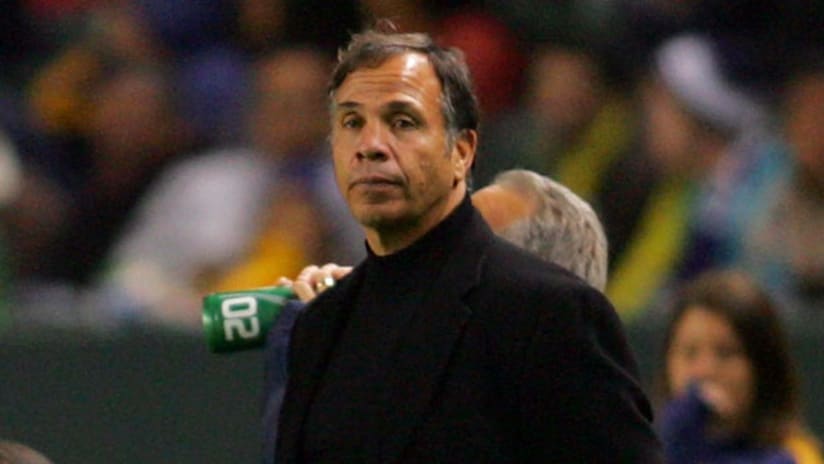EAST RUTHERFORD, N.J. – Raised in a working-class Long Island home as the son of a butcher and a school bus driver, there was little real possibility that Bruce Arena would someday travel the world as a soccer dignitary.
But a poster of the Italian National Team in his grandfather’s Brooklyn sandwich shop made an impression on a 10-year-old Arena that has lasted a lifetime, punctuated Tuesday when he headlined the 2010 induction class into the National Soccer Hall of Fame during a ceremony at New Meadowlands Stadium.
Arena was inducted alongside former NASL star Kyle Rote Jr., two-time US World Cup veteran Thomas Dooley, MLS icon and current Toronto FC coach Preki and longtime soccer reporter Paul Gardner.
Now considered one of the most identifiable and formative figures in American soccer, it’s nearly impossible to imagine the last 15-plus years without Arena. Yet he came from an auspicious background to land where he is now, head coach of his third MLS team and still the most successful coach in US National Team history.
“Lacrosse, American football and baseball were the sports in my childhood household,” Arena said, adding his memories of poster hung on the wall of his grandfather’s shop. “Soccer was nowhere to be seen or heard. As a 10-year-old, I simply made a mental note of what, to me at the time, was an incredibly unusual sport.”
Arena’s soccer career famously blossomed from that moment, a kid who once worshipped Mickey Mantle eventually transformed into the most accomplished American soccer coach in history. Though his playing career was comparatively pedestrian – he largely rode the bench as a backup goalkeeper in the NASL – he succeeded wherever he went as the man on the sidelines.
His career began in earnest with a run of success at Virginia which included five national titles and the development of players like Jeff Agoos, Tony Meola, Claudio Reyna and John Harkes.
[inlinenode:315598]Then came back-to-back MLS titles with D.C. United in 1996 and 1997, and titles in the CONCACAF Champions' Cup and Intramerican Cup with the club in 1998.
But Arena – who went on to coach in MLS with the New York Red Bulls before taking his current job in 2008 with the Los Angeles Galaxy – saved his best memories Tuesday for the calling card of his career: unparalleled success with the US National Team.
Arena led the Americans to quarterfinals of the 2002 World Cup in South Korea, springing a 3-2 upset over Portugal in the group-play opener that springboarded the team to their most successful World Cup run to date.
“Hearing our national anthem in the aftermath of 9-11 was one of the most emotional experiences of my life,” Arena said of the World Cup opener. “To be part of that day, where the US stepped on the field … and to demonstrate to the world that we’re a united country and we can put a product on the field was the absolute highlight of my career.”
Arena also heralded the Americans’ effort in a 1-1 draw against Italy during group play at the 2006 World Cup in Germany, a match when Arena carried the mass card from his late Italian father’s funeral in his pocket to face the eventual World Cup champions.
“Our team fought courageously that day,” Arena said. “Getting that result against Italy … was a very special experience.”
[inlinenode:315597]Arena also shared memories of D.C. United’s 1996 MLS Cup run, and thanked MLS and US Soccer coaching figureheads and longtime friends Bob Bradley, Dave Sarachan and Glenn Myernick.
But he reflected on tough periods, too, including a spell in 2007 and 2008 after he parted ways with the Red Bulls after an underwhelming 15-month stint there. He eventually landed square in the middle of the David Beckham era in Los Angeles, hired to take the reins there by MLS founding fathers Phil Anschutz and Tim Leiweke.
“I was a coach without a team, and I wasn’t building a whole lot,” Arena said. “Change is necessary to be successful, and they brought me back into the game and they allowed me to do what I loved to do.”
Arena added that he still receives notes and well wishes from his former players, confirming perhaps more than any title that the path he chose from humble backgrounds to sports royalty was one blessed with fortune and destiny.
“I wanted to make a difference. I wanted to build teams and have successful teams,” Arena said. “But more importantly, to create and develop young people, and to try and build relationships that I could have for the rest of my life.”
Watch Bruce Arena's induction speech:


